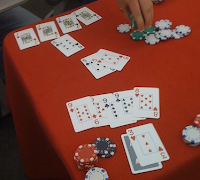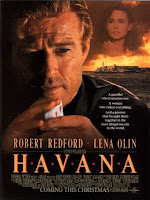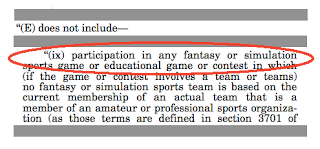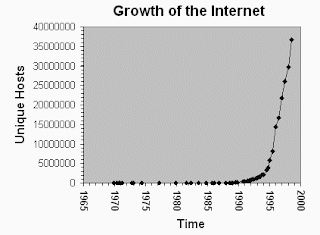
Over the last couple of months I’ve come to appreciate more and more what Bill Simmons and his collection of writers are doing over at
Grantland.
I’ve mentioned Grantland here a few times, such as last June when alluding to
Rounders co-scripter Brian Koppelman’s interesting op-ed that appeared on the site called “
The Beauty of Black Friday.” I
brought up Grantland again in late July when referring to the novelist Colson Whitehead’s novella-length account of his experience World Series of Poker that ran on the site.
And last month James McManus did a turn on Grantland to recap the “Full Tilt Boogie” in which he presented the story of Black Friday and its messy aftermath to a wider audience, so
I made mention of that, too.
Poker only turns up now and then on Grantland. The site primarily focuses on in-depth analyses of sports as well as some interesting and similarly detailed essays on popular culture. Bill Simmons is the Editor in Chief and lead writer on the site. In one of those earlier posts I characterized Simmons as “some sort of superblogger, one of these endlessly passionate fans who will go on and on and
on with little acknowledgment that it might seem self-indulgent or obsessive to do so.”
I wrote that about Simmons with full self-awareness that I, too, have been guilty of such self-indulgence now and then here on Hard-Boiled Poker. But I do try to be mindful of the fact that quality trumps quantity when it comes to any sort of writing, not to mention the fact that readers are much less likely to stop and read thousands of words about anything unless they are similarly passionate and/or interested in the subject.
Grantland was begun back in the spring as kind of a carve-out from ESPN (where Simmons has written for years, including occasionally about poker) to provide a space for long-form writing about sports and entertainment. And as I say, I’m coming around to enjoy the site more and more, including
the podcasts.
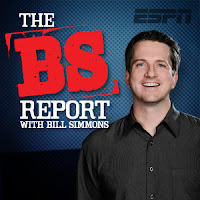
I particularly like Simmons’ own “B.S. Report” podcast, having gotten into it a lot over the last couple of months in order to hear him talk with a variety of guests about the NFL season and playoffs.
On Monday’s show (1/23/12), Simmons was talking with the always funny Cousin Sal about how both of the conference championships that took place on Sunday interestingly turned on player mistakes that created a few more “goats” than “heroes” in the games. Indeed, while the New England Patriots and New York Giants both played well and deserved their victories, both benefited considerably by opponents’ errors that helped make their victories possible.
In fact, both contests saw late-game miscues -- a couple of fumbles in the Niners-Giants game, a muffed catch and missed field goal in the Ravens-Pats one -- that were on the flukey side. That is, they were mistakes to be sure, but it is easy to imagine them having been avoided and the outcomes being different.
Simmons used a poker analogy to explain his point further, bringing up an idea that those of us who play poker know quite well.
“I came to the realization yesterday that… there’s gonna be these NFL seasons where you have four or five or six teams that are all basically the same talent level, and then they play and it becomes a poker hand,” said Simmons. “It’s like everybody can do everything relatively the right way, but it’s still going to come down to… the last card… on the river. And I need this and you need this and our percentages are pretty much equal and then that happens and then you win.”
In terms of a given hand, Simmons is describing one of those “coin flip” situations in which all decisions have been made and players’ fates are now to be decided by whatever card peels off the deck. Both players apparently have played the hand well, and now the odds of each winning is roughly the same.
Of course, the analogy also includes a slightly different observation, namely that when two players of essentially equal skill level sit down to play poker, luck will ultimately decide who walks away a winner. (I think the latter is actually the primary point Simmons was making here.)
All of which I found interesting and relevant as part of an analysis of what happened on Sunday. I’m still a little amazed at how Simmons pours out thousands upon thousands of words each week about a given game, then invites multiple guests on his show to break down the games even more.
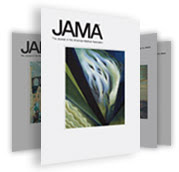
Last week Simmons’ ESPN colleague
Rick Reilly responded to a reader’s email complaining that he’d left out mentioning something in a column by making reference to his desire to keep his columns a reasonable length. “I try to keep all my columns under 900 words so people don’t have to quit their jobs to read me,” wrote Reilly. “It’s just sports, not the American Medical Journal. Not everything fits in 900 words.”
That particular “mail bag” column by Reilly ballooned over 2,800 words, actually, although as he says he usually keeps it around 1,000 words or less, such as he did in
the column about 49ers kicker David Akers about which that particular reader was complaining.
One of Simmons’ readers mentioned Reilly’s comment to him, and Simmons shared the message in
his own “mail bag” column from last Friday. Referring to Simmons’ prolixity, the reader remarked that Simmons -- who goes by “the Sports Guy” -- might consider changing his nickname to “the American Medical Journal Guy.”
Simmons replied that thanks to that snarky comment he was going to try for 7,500 words in that column. In fact, he almost made it, getting up over 7,200 before signing off.
I’ve already shot past the 1,000 word-mark myself in this post, and since I don’t have the same aspirations -- or inspiration -- to aim much higher, I think I’ll be signing off soon. As I said I do understand and appreciate Simmons’ approach. And while sports or poker probably aren’t as important in a practical sense to the discoveries being shared in the
Journal of the American Medical Association, that doesn’t mean they aren’t worthy of close, extended scrutiny.
After all, how we play and experience games tell us a lot about ourselves, and learning about ourselves can be as meaningful to improving our lives as can finding out how to treat a disease. Besides it is hard to be inspired by writers who aren’t inspired themselves. Or, to put it another way, I’m not really that into spending my time reading a sports column only to be told "it’s just sports.”
By the same token, I also think (like I assume Reilly does) that more isn’t necessarily better, and it’s possible to start saying less the more words you pile on. I believe Simmons is plenty aware of that, though. The self-effacing highlighting of his initials -- B.S. -- in his podcast title suggests as much.
Quite succinctly, in fact.
Labels: *the rumble, Bill Simmons, Grantland, journalism, writing
 Bill Rini offers us a good read today with a post titled “The Death of Poker Media?” There Bill comments at length about how poker publications like Card Player have clearly been affected significantly by Black Friday and the sudden down-sizing of online poker in the U.S. that happened in its wake.
Bill Rini offers us a good read today with a post titled “The Death of Poker Media?” There Bill comments at length about how poker publications like Card Player have clearly been affected significantly by Black Friday and the sudden down-sizing of online poker in the U.S. that happened in its wake.